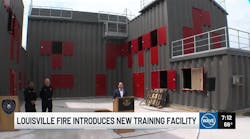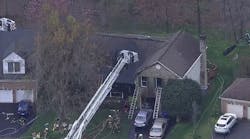This week's visit with you focuses on the concept of customer service. What is service and who is the customer? Webster suggests that service is the work performed by those who serve others. I suggest that anyone who may need help from your agency has the potential to be the customer.
The work that you and I do for others in the fire and emergency service world surely meets the criteria for working to serve others. Then there is the further concept of customer service which is getting a great deal of buzz these days. What then is the difference between plain, old service and effective customer-oriented service? I believe I saw that difference in Indianapolis back in April.
It is my belief that effective customer service requires you to undertake an outward effort. You are extending yourself and your efforts to help someone else. It is important for you to remember that any joy or self-gratification which you receive should be as result of the joy derived from helping someone else benefit from the service you provide. Their happiness is your reward.
How many times have you and I have used the words put forward by Alan Brunacini on the subject of customer service? More than once I would imagine. The concept of Mrs. Smith was served up to my men in Newark on more than one occasion as the reason for their being in the fire service.
On more than one occasion, my words were met by quizzical stares and open mouths. Many times the troops would confound me with their questions. Why should we worry about customer service Chief? Who else is there to put out fires in people's homes here in Newark? Let them call someone else if they don't like what we do. This is that inward focus which almost always stymies the best in service to one's community. We must think outwardly if we are to succeed in servicing the customer.
It is my hope that the use of the Brunacini approach to service led to a few long-term converts to the cause of customer service delivery. However, I worry that without a continuing effort our fire service will sink back to its old, selfish ways.
It is my belief that customer service has been a tough sell in our business because far too many people are wrapped around the wheel of fireground glory. The bright lights and glory put forward for the rare example of true heroism blind our people to the satisfaction which can be derived from the daily performance of our duties.
Perhaps this happens because we don't know what we are selling. Many times we fail to identify our product for the people who will be selling that product to the public. If we are to be expected to provide satisfactory customer service, we must first define what effective service is and then come to an agreement on the nature of the product which serves as the basis of satisfactory service.
In our case that product is a life-saving service that is frequently delivered in very boring ways. Fires are an exciting event: preventing them is not. However the latter is normally far more important. The same holds true with training. It is not exciting, but it sure is critical to every aspect of organizational success that you will ever hope to achieve.
Let me share with you an example of outstanding service that my buddy Jack Peltier and I experienced during the Fire Department Instructor's Conference (FDIC) in Indianapolis last month. Oddly enough it had nothing to do with the fire service. This little bit of outstanding service came during the many breakfasts Jack and I enjoyed at the Circle City Bar and Grille in the Marriott Hotel, across from the convention center.
The service started with the gentleman at the wait station pedestal. We were met with style and charm. What was the product that fellow was selling? Movement control might be the name to use for his job. He was delivering service, pure and simple service. His job was to see that Jack and I were seated so that we could partake of the breakfast buffet. He could have sulked as he found us a place to sit, but this he did not do. We were greeted with a smile and a kind word. As the days passed, the smile grew brighter and the words kinder.
When I noticed that one of the ladies on staff was beginning to get on his case, I offered a simple bit of advice to him that might allow him to get around the problem. When faced with a situation that might lead to a negative comment I advised him to just try "zipping his lip." He accepted my advice with a big smile and vowed he would try it.
The next morning he took great pride in sharing his story with me as we moved to our table. It seems that his girl friend started getting on his case about something, and he thought of what I had said about making an unguarded comment. He told me that he had in fact zipped his lip and rode out the problem. His thanks seemed to be not only profuse, but most sincere indeed. Sadly I failed to note his name for the record.
How many of you met the exact opposite of this man during your time in Indianapolis? Heck, the folks at the Westin next door were correct and proper, but hardly friendly. I was merely someone who needed a seat and a bite to eat. Same service: different delivery.
Let me urge you to begin looking at the people around you in the world for examples of the friendly service provided by this lad at the front pedestal. That young man will probably not remember me, but I sure remember him. I also remember a really grumpy wait staff at another nameless facility located in downtown Indianapolis.
Once Jack and I were seated, Delores came into our lives. Delores was our waitress. We remembered her from previous years at the same venue and oddly enough, she remembered us. Not by name, but by face. Of course it might be easier to remember two men who happened to be six feet-five inches tall and tip the scale at over -----, well let me say that we are men of volume.
Since we were dining from the buffet, you might think that we would receive very little service from our waitress. Not in the least. Our coffee cups and water glasses were kept brimming full. More orange juice was just a smile and a nod away. When she had a moment she would just stop by and kibitz with us. As you might imagine, Jack and I are past masters at the art of bantering and creating chit chat. So too was Delores. Her approach to service was definitely hands-on.
Let me now share my conversations with the man who crafted my ham and cheese omelet on more than one occasion. Damon was his name. I had wanted to chat with him, but his normal routine did not allow time for small talk. On our last day before going home, the crowd in the restaurant was quite small indeed. As the Damon was creating my omelet I asked him whether he would rather work during a busy morning shift or a slow morning shift.
Without missing a beat he said quite simply, "busy is better." There was a man sharing his thoughts on what many would consider a boring, repetitive job. He was a man who had a big smile on his face as he deftly flipped my omelet and tossed it onto my plate. He wanted to make omelets and send people on their way happy and not hungry. How many of your people do their jobs with a smile?
While Jack and I were dining, we noticed a very perky young lady moving around the room, greeting customers and helping the staff to keep things moving. She was a blur of activity as she moved thither and yon with a beaming smile for one and all. We watched her each day as she worked to keep things moving.
No matter what the problem, she responded and worked diligently to create order from chaos. Does that task seem familiar to some of you fire officers out there. Perhaps bringing order from chaos is a skill we need to accentuate in our officer training programs.
Finally Jack and I could hold our curiosity no longer. On our last day in Indianapolis we engaged this charming dynamo in a most enlightening conversation. We discovered that her name was Angela Buran, and she was the restaurant manager.
Given the number of plates I saw her carry and the number of cups of coffee she poured, I would never have guessed the nature of her real job. Since the restaurant was exceedingly quiet on Sunday morning, she had the time to devote to a conversation with Jack and me.
We soon discovered that Angela was moving through a variety of assignments with the franchise corporation that controls a number of Marriott properties in middle- America. This energetic young lady holds both bachelors' and master's degrees in business administration. She shared her customer-centered view of service with us as we probed ever deeper into her plans for her career.
When asked where she saw herself in ten years, her response was immediate. Angela sees herself as the general manager of a medium-sized property in the franchise corporation for Marriott in the region. She spoke of her earlier assignments in other properties and then laid out a path that spoke of assignments which would have an ever-increasing level of responsibility. She said that her job is really simple. She wants the customer to have a positive interaction with her property.
Let me tell you my friends, Marriott has a gem in the person of Angela Buran. Her job is to create a positive environment wherein the products of her corporation are delivered in an effective and efficient manner. We need to think really hard about how we might be able to adopt this approach to delivering our fire and rescue services.
This may not be as tough an assignment as you might think. There are a number of bright young people out there across America making their way in the fire service world. On my first night in town, I happened to meet a young man who left me with a strong positive image of him and great hopes for the future of the American Fire Service.
That man's name is Bill Cannon and he is a student in the fire protection program at Eastern Kentucky University. He engaged me in an extremely interesting discussion of leadership. He spoke of some issues he faced at school and I shared a bit of my experience in dealing with both faculty and students in general. I truly enjoyed the intellectual give and take with this extraordinary young man.
There is a hue and cry in certain parts of the fire service that tends to dwell on the fact that we, as a fire service, are moving away from our strict suppression origins. Why can't we just fight fires is the question on many lips. I believe that the recent National Fire Protection Association statistics have shown us the way of the future: less firefighting and more of just about everything else.
My background is mainly in suppression. However, parts of my career and volunteer service have involved work in training, hazardous materials operations, fire prevention, strategic planning, and capital budgeting. Each was important to the overall delivery of service to the community. Our field continues to evolve. If we are to hang our hat on the shrinking hook of suppression, we will soon be unable to justify our existence.
This young man's approach was extremely refreshing. He said that he did not care what form his service to the community took. His only concern was that it be an active service. He did not want to just sit around. Who does he sound like when he says that he just wants to be active? Of course my friends, I am referring to the omelet maker Jack and I had met at the Marriott Hotel in Indianapolis.
What then is the secret to service delivery in the fire service? I would suggest that you must first define exactly what it is that you want to accomplish. That accomplishment or series of accomplishments is the product that you will be selling to your customer base. This is called branding in the market place. You must create your brand and then find the right people to sell it.
You must then set reasonable expectations for your people. Come to know them and their capabilities. Once you set the base expectations work from them to deliver your service. Be sure to work within those capabilities. Broaden them, when you can, through the process of training and educations.
When it comes to people, make sure that you are attracting people who understand that there is more to what we are doing these days than simply firefighting. You must meet this problem head on. Greet your people at the front door with a positive attitude toward service and keep training them to do their job until the day they retire.
Live the example for your people. Please do not practice a type of management that has come to be known as "do as I say and not as I do management". Please do not say that this task is something beyond what you can do. If you practice this false style of management, people will recognize you as a phony and your efforts will fail.
If the lovely people that Jack Peltier and I met in Indianapolis can become enthusiastic about greeting people at the host's pedestal in a hotel restaurant, serving them coffee, creating their omelet and making them comfortable, your job should be golden.
You are offering hard work, danger, and excitement to your troops. You are wrapping up the chance to serve others within the garb of one of our nation's most respected fields of endeavor. But I would suggest that you must work to create this understanding of product and customer service in the minds of your folks.
How can you fail? Simple my friends: by not trying.





